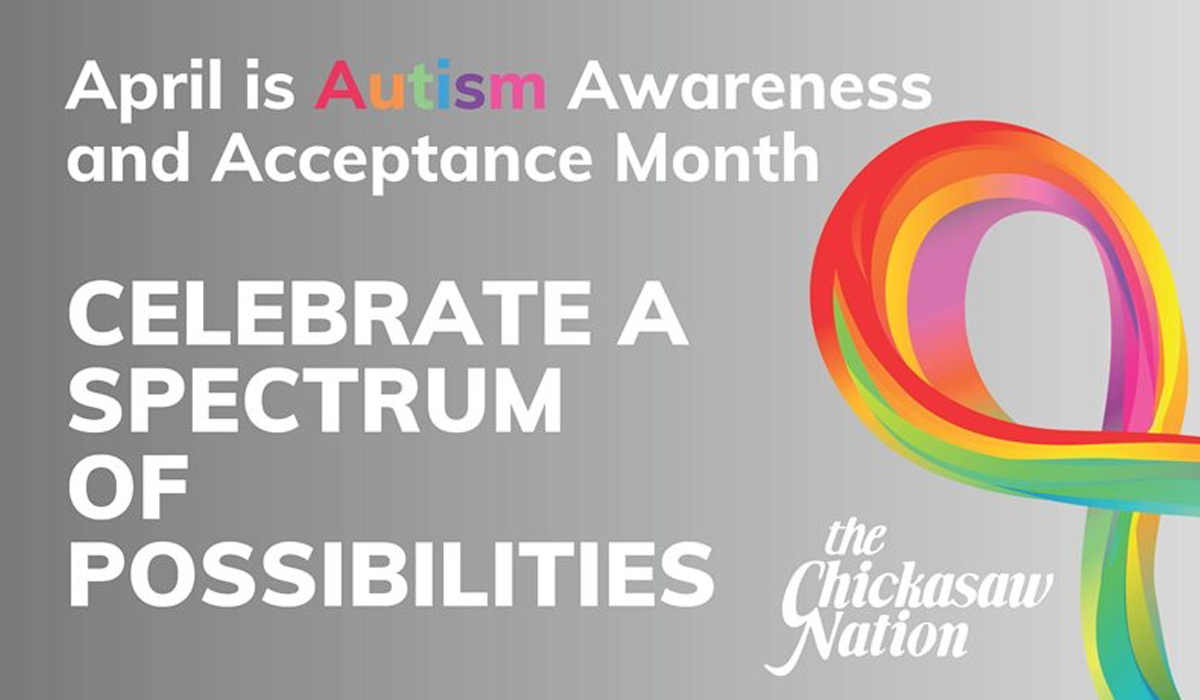Chickasaw Nation
April is World Autism Month. Chickasaw Nation Governor Bill Anoatubby, in conjunction with the Autism Foundation of Oklahoma, first declared April Autism Awareness and Acceptance Month within the Chickasaw Nation in 2023.
However, the Chickasaw Nation has been expanding clinical services for First Americans with autism and fostering a positive understanding around the diagnosis for years.
Autism or autism spectrum disorder (ASD) refers to a broad range of conditions characterized by challenges with social skills, repetitive behaviors, speech and nonverbal communication, according to AutismSpeaks.org.
The characteristics or symptoms typically shown in early childhood include decreased social interaction, communication, and repetitive or challenging adaptive behavior. No two individuals with ASD are exactly alike, and they exhibit a wide range of functional abilities.
“Autism is a condition or a set of traits in which an individual’s brain basically functions differently than most,” Dr. BJ Boyd, senior psychologist for the Chickasaw Nation, said. “Typically, during the time frames of prenatal through early childhood development, the traits a person might exhibit are often determined.”
ASD contains multiple conditions once regarded separately, according to the Mayo Clinic. These conditions include autism, Asperger’s syndrome and Rett syndrome.
“We must focus on the ‘spectrum’ in autism spectrum disorder, which means there’s a wide variation in presentations,” Boyd said. “Something in the way the brain develops causes people to be on the autism spectrum, and it creates varying levels of delays to social and interpersonal elements of communication,” he said.
People with autism can struggle to understand ways in which the general population may perceive things, think or behave, sometimes referred to as the “norm,” Boyd said.
“Being able to pick up on nonverbal cues like tone of voice and facial expressions or understanding common social interactions can be difficult, and it’s not for a lack of wanting to,” he said. “It is just very difficult for some people on the spectrum to do that.”
Through research, the Centers for Disease Control and Prevention announced last year 1 in 36 children are now diagnosed with autism, an increase from 1 in 44 children two years ago. With it becoming more prevalent, it is important to be aware and accepting of people with autism.
“When interacting or communicating with an autistic person, it’s helpful to remember that autistic individuals are just people who perceive many things differently than the typical person,” Chickasaw Nation Pediatric Mental Health Care Clinical Lead Alicia Baker said. “What is considered normal conversation or normal physical touch may actually be aversive to an autistic person.”
The Chickasaw Nation provides multiple resources for families with autistic children.
“For almost five years, the tribe has started a huge emphasis on autism services,” said Dr. Shannon Dial Chickasaw Nation Senior Psychologist and Executive Officer for the Department of Family Services.
Dial said with the help of medical family therapists, the department of family services and department of health are able to give developmental screenings, accurate diagnoses and treatment plans for children with autism.
The Chickasaw Nation Department of Education plays a big role in supporting the mission of early intervention in diagnosing ASD.
“Early intervention is all these services together: intervention, occupational therapy, speech pathology and education,” Chickasaw Nation Speech Language Pathologist Pamela Beard said. “Early intervention can change the whole trajectory of a child with autism and their development.”
More autism resources are on the horizon with the Chickasaw Nation.
“We’re working on a stand-alone pediatrics building slated to open in 2025, and that building will include general pediatrics and developmental behavioral pediatrics,” Dial said. “It will have a developmental clinic which we believe is the first of its kind in Indian Country.”
Dial said the new pediatric building and the upcoming developmental behavioral resources are thanks to leadership.
“We’re kind of on the frontier of really, really big expansions here, and that expansion is made possible by a leadership that supports this cause,” Dial said.


